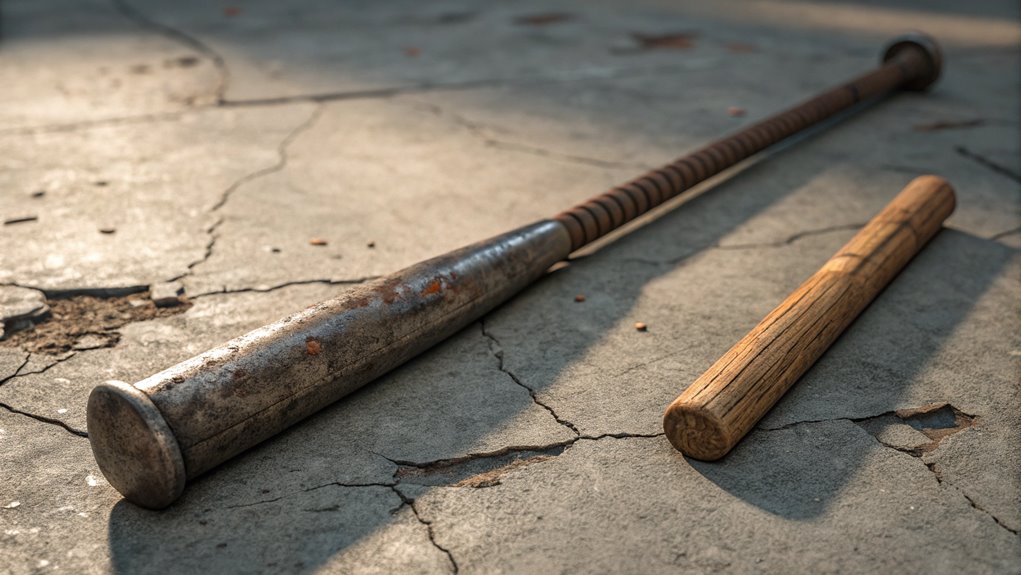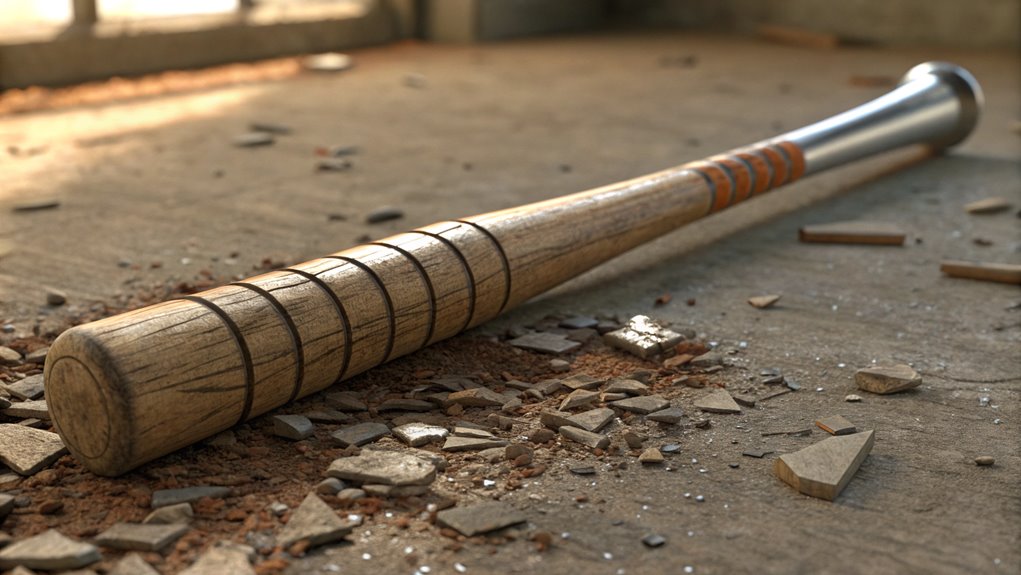When you're choosing between steel and wooden batons for self-defense, it's super important to reflect on how each one feels and performs. Steel batons are strong and durable, meaning you get powerful blows, but they can be heavy and harder to handle if you're not experienced. On the other hand, wooden batons are lighter, offer a good grip, and are easier to carry, but they're more prone to cracking or splintering. So, if you want something reliable or a bit easier to manage, you've got options to weigh carefully. There's a lot more to reflect on, so stick around for the details!
Overview of Batons

When considering batons, you'll find they come in various materials, each designed for specific uses. The history of batons dates back centuries, serving as tools for defense and law enforcement.
You've got wooden batons, which are often lighter and can provide a solid grip, making them excellent for self-defense in close situations. Then there are metal batons, like steel, which offer durability and strength, perfect for more demanding encounters. Another option is the 110,000,000 volt Bad Ass Metal Stun Baton, which combines stun power, flashlight capability, and the durability of aircraft quality aluminum.
Each of these baton materials has its pros and cons, so it's important to think about what you need. For instance, if you're looking for something easy to carry around, a lightweight wooden baton might be the way to go. But if you want something that can withstand a lot of force, you'll probably lean towards a steel baton.
In today's world, personal safety is vital, and being prepared with the right tools can make all the difference. Knowing the baton history and understanding the materials available can empower you to make informed decisions about your self-defense options. The Telescopic Steel Baton is a popular choice, offering a compact design and a rubber handle for improved grip.
Advantages of Steel Batons
For those seeking reliability in self-defense tools, steel batons offer several distinct advantages. First off, their durability factors are impressive, making them a smart choice for anyone concerned about safety. Unlike wooden batons, steel batons don't crack or splinter easily, meaning they stand up to tough situations. This durability guarantees you won't have to worry about your tool failing when you need it most. Another key benefit is their impact resistance. Steel batons can deliver a powerful blow without bending or breaking, making them effective in self-defense scenarios. You can trust that when you swing it, it'll make an impact. Additionally, Pointed Glass Breaker end caps can enhance the tactical use of steel batons, providing an extra layer of functionality.
Here's a quick comparison to highlight some advantages:
| Feature | Steel Batons | Wooden Batons |
|---|---|---|
| Durability | Very High | Moderate |
| Impact Resistance | Excellent | Low |
| Weight | Heavier | Lighter |
Disadvantages of Steel Batons

While steel batons are known for their durability and impact resistance, they come with notable disadvantages that potential users should consider.
First off, one major issue is the weight. Steel batons can be quite heavy, making them more difficult to handle, especially for beginners or those who mightn't have the strength to wield them effectively. Imagine trying to swing a heavy object when you really need to defend yourself quickly; it could put you at a disadvantage when every second counts.
Then there are the safety concerns. Steel batons, while intended for self-defense, can cause serious injuries if used improperly or in heated situations. You might find yourself in a scenario where you accidentally hurt someone more than you intended, leading to legal troubles or even personal guilt.
Plus, if you're carrying one around, people might view you as a threat, which could escalate situations instead of calming them down.
In short, while steel batons have their perks, you should weigh these disadvantages carefully. Consider whether the weight and potential safety issues are worth it for your personal safety needs.
Advantages of Wooden Batons
Steel batons may have their strengths, but wooden batons offer several compelling advantages that make them a favorable choice for many users.
First off, let's talk about durability comparison. While some might think wood isn't as tough, a well-crafted wooden baton can withstand a lot of wear and tear. Plus, if you drop it, you won't have to worry about it bending or denting like steel.
Now, grip comfort is another area where wooden batons shine. The natural wood texture provides a cozy, non-slip grip, making it easier for you to hold on, especially during intense situations. You don't want your baton slipping out of your hands, right?
Also, wooden batons are generally lighter than their steel counterparts, which means you can carry them around without feeling weighed down. This can make a huge difference when you need to act quickly.
Finally, there's something about the feel of a wooden baton that can boost your confidence. It's not just a tool; it can become a part of your self-defense strategy.
Disadvantages of Wooden Batons

Despite their many advantages, wooden batons come with notable disadvantages that shouldn't be ignored.
First off, you might run into durability concerns. Wooden batons can easily crack or splinter, especially if you're using them frequently or in intense situations. Imagine relying on a tool that can break when you need it the most—that's a scary thought!
Then there are the maintenance issues you'll have to deal with. Unlike steel batons that require minimal upkeep, wooden batons demand more care. You'll need to regularly check for scratches, dents, or any signs of wear and tear. If they get wet, you risk warping, which can compromise their effectiveness.
Plus, if you're not on top of things, you could end up with a baton that's less reliable when you really need it. Think about it: you wouldn't want to be caught off guard with a tool that could fail you in a tough situation.
Choosing the Right Baton
When it comes to choosing the right baton, you'll want to take into account several key factors to guarantee it meets your needs.
First, consider the material durability. Steel batons are known for their strength and resilience, which makes them ideal for tough situations, while wooden batons can crack or splinter under pressure. If you're looking for something that can withstand rough handling, steel might be the way to go.
Next, think about grip comfort. You'll want a baton that feels good in your hand, especially if you have to use it in a stressful situation. Some batons come with rubberized grips, providing better control and preventing slips during use. A comfortable grip can make all the difference when you need to act quickly.
Also, consider your personal situation. Are you looking for something lightweight for easy carry, or do you need added weight for impact? Each choice has its pros and cons, so weigh them carefully.
Ultimately, the right baton should feel like an extension of yourself, reliable when you need it most. Keep these factors in mind, and you'll be better equipped to make an informed choice that prioritizes your safety.
Answers to Common Questions
Can Batons Be Customized for Personal Use?
Yes, you can definitely customize batons for personal use! Explore various baton personalization options and create custom baton designs that reflect your style, ensuring your baton stands out and meets your specific needs perfectly.
Are There Legal Restrictions on Baton Ownership?
Imagine a gardener tending to diverse plants; similarly, baton regulations vary widely. You'll find legal ownership restrictions depending on your location, so always check local laws to guarantee you're cultivating your collection legally and safely.
How Should Batons Be Maintained and Stored?
To maintain your baton, use proper baton cleaning techniques like wiping with a damp cloth. For baton storage solutions, keep it in a cool, dry place, away from direct sunlight, to prevent damage and deterioration.
What Are the Best Brands for Batons?
When choosing the best baton brands, consider your needs and preferences. Look at material comparisons—some excel in durability while others offer lightweight options. Popular brands include ASP, Monadnock, and SABRE, known for quality and performance.
Can Batons Be Used in Self-Defense Situations?
Batons can be like a shield in a storm when it comes to self-defense techniques. Their effectiveness lies in how you wield them, providing a solid means to protect yourself in dire situations.
Bottom Line
In the end, choosing between a steel or wooden baton is like picking between a rock and a hard place. Both have their perks and pitfalls, and it really boils down to what feels right for you. If you want something sturdy and tough, steel's your go-to. But if you prefer something lighter and easier to handle, wooden batons might be your best bet. Remember, it's all about personal safety, so pick wisely and stay prepared!




